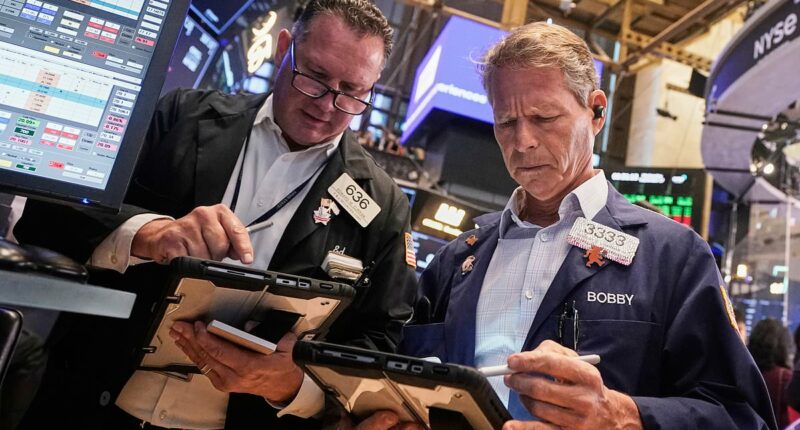Share this @internewscast.com
While a handful of stocks are soaring as a result of the Artificial Intelligence boom, others are taking a serious hit.
Advances in AI have pushed Nvidia, which makes chips essential to AI’s language models, to a valuation of over $4trillion.
Big technology companies that are racing to compete with one another, such as Meta, Microsoft, and Oracle, are also riding high.
However, the displacement caused by this rapid momentum is also leading investors to move away from formally lucrative and stable stocks.
In the early days of the AI surge in 2023, Bank of America initiated a crowdsourced selection of stocks that might be vulnerable to losing business and, consequently, value due to technological advancements.
Among the potential victims were image licensing company Shutterstock and language learning app producer Duolingo.
The basket of stocks had roughly kept pace with the broader market since OpenAI released its groundbreaking ChatGPT in October 2022.
However, since mid-May this year the group has trailed the S&P 500 by around 22 percentage points, Bloomberg reported.
Even with the dramatic shifts in the tech field over the past two years, a study by the Daily Mail highlights how a number of these stocks have been impacted by the growth of AI.

Nvidia’s computer chips have become the technology at the middle of the AI boom

Advances in AI have pushed Nvidia to a valuation of over $4trillion (Pictured: CEO Jensen Huang)
Many of the companies in the basket are in industries which are already seeing the impact of AI.
Between the beginning of the year and September 16, Shutterstock experienced a decline of 27.51 percent, while Adobe, known for its digital media and marketing software tools, saw a 20.75 percent drop.
It appears investors are betting that users may increasingly be able to use AI to create images and marketing campaigns.
Coca-Cola, for example, demonstrated companies’ willingness to do so by releasing an AI-generated holiday advert late last year.
Website development company Wix.com, which was also identified as at-risk, encountered a 17.04 percent decrease in the same timeframe.
Duolingo’s app, which is its most popular product, offers gamified courses on 43 languages.
Since its listing in the US four years ago, the app has expanded swiftly, boasting over 10 million paying users by the first quarter of this year and gaining fame for its green owl mascot, Duo.
In May, the company announced a shift to become ‘AI first’, leading to immediate criticism from customers, despite not having laid off any staff members.
It appears investors may also be worried about the company, especially after Apple announced new headphones earlier this month which are able to translate languages in real time.
In the year to September 16, the company’s stock dropped 13.41 percent.

In the year to September 16, Shutterstock dropped 27.51 percent

Duolingo’s stock dropped 13.41 percent in the year to September 16
GoDaddy, the internet name registrar and web hosting company, was also flagged as potentially at risk, and has indeed seen its stock fall over 27 percent in the last year.
The company has also faced a period of significant underperformance which has contributed to its stock trading lower.
Among the basket of stocks, Robert Half has seen the biggest drop in the year to date.
The company is a human resource consulting firm and recruitment agency. In the last year its stock has tumbled almost 50 percent.
While AI’s impact will not be uniform, it is likely to affect administrative companies that are automatable.
This includes roles such as customer service, data entry and processing, telemarketing and scheduling.
Fellow recruiter Manpower Group was also on the at-risk list, and its stock has fallen by a substantial 33.68 percent since September 2024.
Fiverr, an online marketplace for freelance services, has also struggled with investor pullback, and has seen its stock plummet 26.82 percent in the last year.

The rise of AI has had a significant effect on the stock market over the last several years

Among the basket of stocks, Robert Half has seen the biggest drop in the year to date
‘We see knowledge and services business as highly vulnerable as AI continues to accelerate,’ said Daniel Newman, CEO of research and advisory firm the Futurum Group.
‘Industries like consulting, accounting, marketing, and research can all be done much more quickly and with less friction using AI tools.’
Software engineering is also becoming a rapidly disrupted area, he said, with large swaths of big tech slowing hiring and implementing AI to support code generation and development.
‘My conversations with CEOs across tech all indicate that they expect to be able to slow hiring,’ he told the Daily Mail.
‘There is optimism that the multi-trillion dollar productivity boom that is expected from AI will be a catalyst for new types of roles, the speed of this disruption has made those exact roles more opaque at this time.’
Some of the companies which were deemed potentially at risk in 2023 have in fact seen huge growth amid the AI boom.
Google parent company Alphabet, for example, this week joined an elite group of firms which are valued at more than $3 trillion.
In the past year, the tech giant’s stock has soared by 32.68 percent as demand for AI products has lifted sales.

Google parent company Alphabet this week joined an elite group of firms which are valued at more than $3 trillion (Pictured: CEO Sundar Pichai)

Steve Sosnick, chief strategist at Interactive Brokers, warned about the potential risks from the AI boom
‘AI has been a major catalyst for stocks — not just this summer, but really starting more than two years ago when it helped snap equities out of a bear market,’ Bret Kenwell, US Investment Analyst at eToro, told the Daily Mail.
‘While stocks like Nvidia have been in the spotlight, many other firms have been major beneficiaries of AI and AI infrastructure buildout.’
Companies are pouring money into this space and are not slowing down despite economic uncertainty, he added.
‘While semiconductor firms, utilities, and mega-cap tech have been the main beneficiaries so far, we could eventually see a trickle down effect within tech, with cybersecurity and software firms benefiting from AI applications.’
But Steve Sosnick, chief strategist at Interactive Brokers, has warned that there is potential for risk for the market as a whole.
The whole market is predicated on the AI trade, and in April when President Donald Trump unveiled his tariff plan, we saw that big tech stocks underperformed the broader market, he said.
‘We had a situation where there was a rush to the exit and those stocks underperformed.
‘They did bounce back, and quite spectacularly, but that is the risk when you have very crowded trades and a huge consensus that these trades will persist.’

‘AI has been a major catalyst for stocks — not just this summer, but really starting more than two years ago,’ said Bret Kenwell, US Investment Analyst at eToro

Big tech stocks underperformed in the broader market when tariffs were unveiled in April
Some experts have compared AI stock growth to the dot-com bubble, when internet-based companies saw a huge boom in the late 1990s before crashing in the early 2000s.
‘To use the old saying, history doesn’t repeat but it often rhymes. There are definitely some rhyming elements to this investment cycle,’ said Sosnick.
When it comes to the AI boom, there is huge momentum and investors are worried about losing out on the chance to make bumper profits.
‘I’ve been calling it ‘MOMO’ and ‘FOMO’. There’s the momentum aspect of it, and there’s the fear of missing out.
‘And the fear of missing out, I actually think, is less about individual investors and more about institutional investors. Because the performance among the relatively small cadre of names has been so dominant that they can’t avoid them.’
But the key difference for Sosnick is that in the internet age people were throwing money at companies that had no profit or a very thin path for profit.
‘Whereas now the companies, like Microsoft, Nvidia and Meta, are just cash flow generating machines,’ he added.
‘The market is being led by profitable companies and real money.’
Bank of America declined to comment on this story.
















